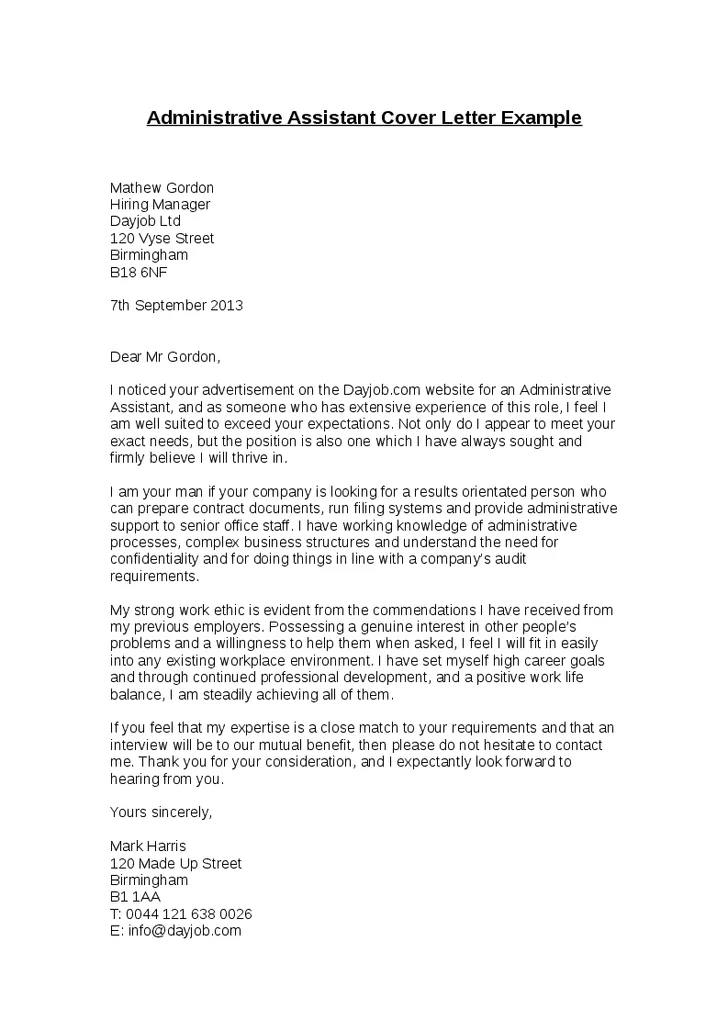Understanding the Secretarial Role Requirements
A secretarial position requires a unique blend of skills and attributes to ensure smooth office operations. The role involves handling administrative tasks, managing communication, and supporting executives or teams. Before crafting your cover letter, it’s important to understand the core responsibilities and expectations. This includes being proficient in written and verbal communication, possessing strong organizational abilities, and having technical proficiency in relevant software and systems. Additionally, the role demands professionalism, attention to detail, and the ability to work both independently and as part of a team. Understanding these elements is vital for showcasing your qualifications effectively in your cover letter and ultimately landing the job. Preparing a cover letter tailored to your secretarial position, showing that you understand these requirements is vital.
Key Skills to Highlight in Your Cover Letter
Your cover letter is your chance to demonstrate how well you align with the requirements of a secretarial role. Focus on highlighting key skills that are essential for success. Select skills that align with the job description for better chances of being hired. These skills should be showcased through specific examples, achievements, and quantifiable results. By clearly articulating your abilities and providing concrete examples, you can demonstrate your value to the hiring manager and make a compelling case for your candidacy. This section will look at those skills needed for a secretarial role.
Communication Skills
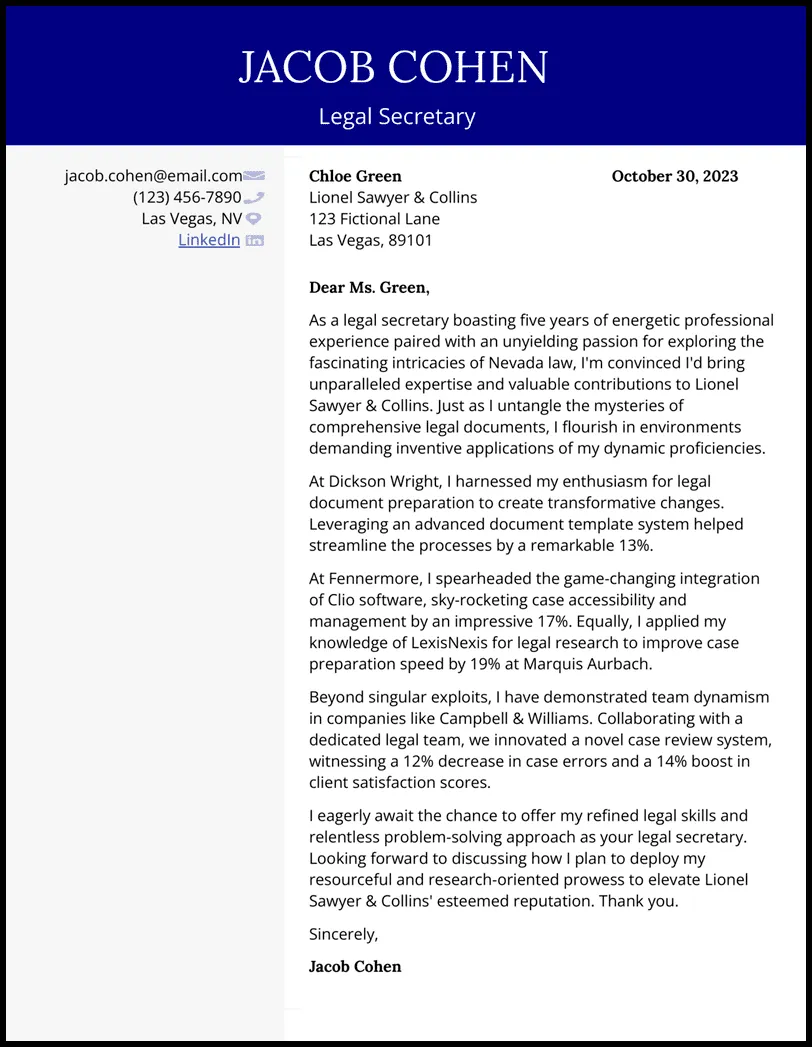
Excellent communication is paramount in secretarial roles. Demonstrate your ability to communicate clearly and effectively both in writing and verbally. Provide examples of how you’ve handled correspondence, drafted professional emails, or communicated with clients or colleagues. Highlight any experience with phone etiquette, active listening, and conflict resolution. Mention your proficiency in business writing, grammar, and spelling. Use positive language and a professional tone throughout your cover letter to emphasize your communication skills. Your ability to communicate with clarity and professionalism will show you can represent the company and make clients feel at ease. It is often the secretary who is the first point of contact with a company.
Organizational Skills
Secretaries are the backbone of office organization. Highlight your organizational prowess by detailing how you’ve managed schedules, coordinated meetings, or maintained records. Mention any experience with time management, prioritization, and handling multiple tasks simultaneously. Show your attention to detail by providing examples of how you’ve ensured accuracy in your work and maintained efficient filing systems. Use action verbs to describe your organizational achievements, such as ‘managed,’ ‘coordinated,’ ‘organized,’ and ‘prioritized.’ Providing examples of how you stay organized will help the company see how you can help them.
Technical Proficiency
Modern secretarial roles require proficiency in various software and systems. Highlight your technical skills by listing the software programs you’re familiar with, such as Microsoft Office Suite, CRM systems, or any industry-specific tools. Specify your typing speed and accuracy. If the job description mentions specific software, ensure you highlight your experience with those tools. Consider including any relevant certifications or training that showcase your technical skills. If possible, provide examples of how you’ve used your technical skills to improve efficiency or solve problems in previous roles. Your ability to quickly learn new software and provide support is also a must.
Formatting Your Cover Letter for Impact
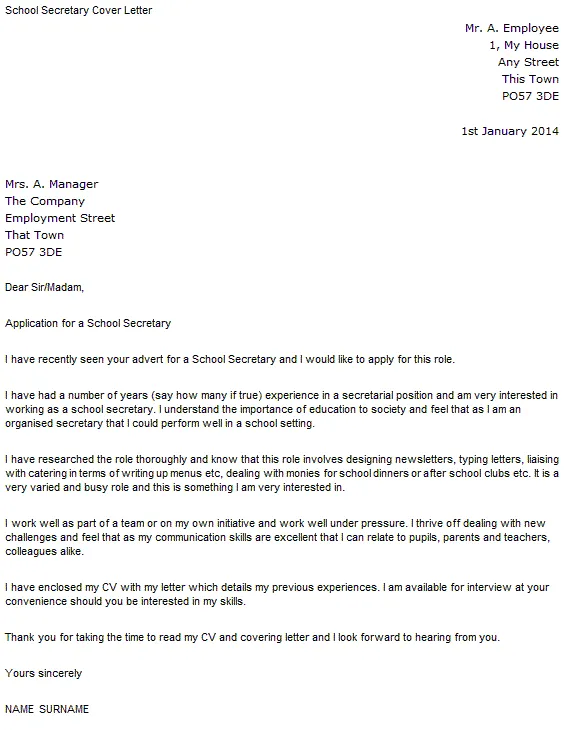
The format of your cover letter is just as crucial as its content. A well-formatted cover letter is easy to read, professional, and visually appealing. It reflects your attention to detail and professionalism. Use a clear and concise format with appropriate spacing, font, and margins. Start by including your contact information, the date, and the recipient’s information. Use headings and bullet points to break up large blocks of text and improve readability. Ensure your cover letter is free from grammatical errors and typos. Proofread the entire document before submitting it. The more professional your letter looks, the higher chances of you getting the job. A well-formatted letter is always appreciated.
Header and Contact Information
Your header should include your name, address, phone number, and email address. Make sure the contact information is up-to-date and professional. Also, include the date and the recipient’s name, title, and company address. Use a professional and easy-to-read font. Your contact information and the recipient should be easy to find and read. This allows the recipient to quickly see who you are and how to contact you if needed.
Professional Salutation
Start your cover letter with a professional salutation. If you know the hiring manager’s name, use it; otherwise, use a general salutation like ‘Dear Hiring Manager.’ Avoid overly casual greetings. A professional salutation sets the tone for your letter and shows that you respect the reader. Personalizing the salutation, when possible, can help you stand out.
Crafting the Body of Your Cover Letter
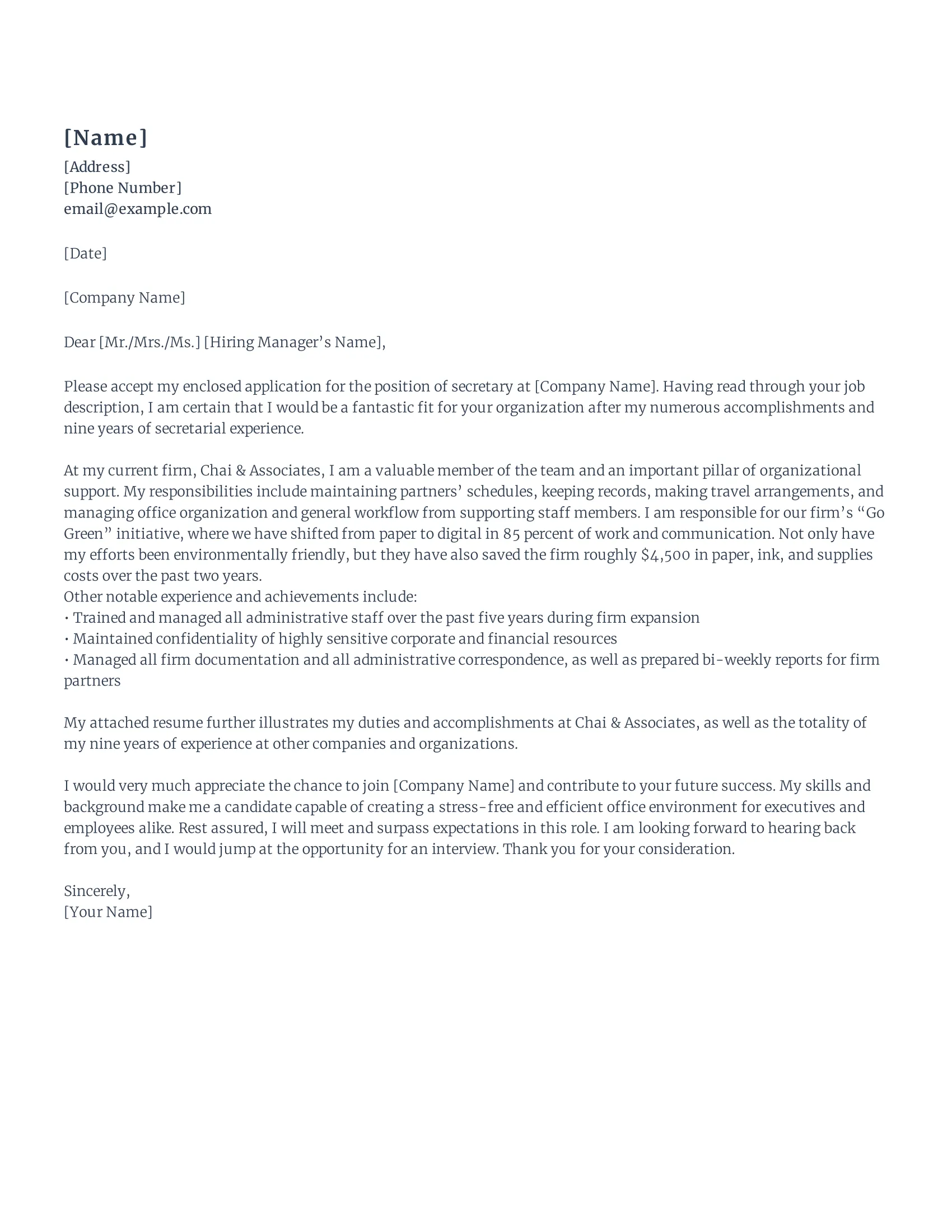
The body of your cover letter is where you showcase your skills, experience, and enthusiasm. Structure the body logically with clear paragraphs, each addressing a specific point. Use a conversational tone while maintaining professionalism. Focus on selling yourself by highlighting your achievements and demonstrating how your skills align with the job requirements. Remember to keep it concise and to the point. The body of the letter is where you’ll make your first impression on the company. Don’t waste this chance!
Opening Paragraph Grab Attention
Your opening paragraph should immediately grab the reader’s attention. Start with a strong statement that captures their interest and introduces you as a suitable candidate. State the position you are applying for and how you found the job posting. Briefly mention your most relevant skills or experiences that align with the job requirements. The goal is to entice the reader to continue reading and learn more about you. Be sure to grab the attention of the reader right away.
Highlighting Relevant Experience
In the body of your cover letter, focus on highlighting your relevant experience. Describe your previous roles and responsibilities, emphasizing tasks that align with the secretarial position. Use action verbs to showcase your accomplishments and contributions in each role. Be specific about the skills you utilized and the outcomes you achieved. Provide concrete examples of how you’ve demonstrated the skills and attributes required for the role. This is your chance to provide details on the work you have done in the past that aligns with the requirements of the job.
Quantifying Achievements
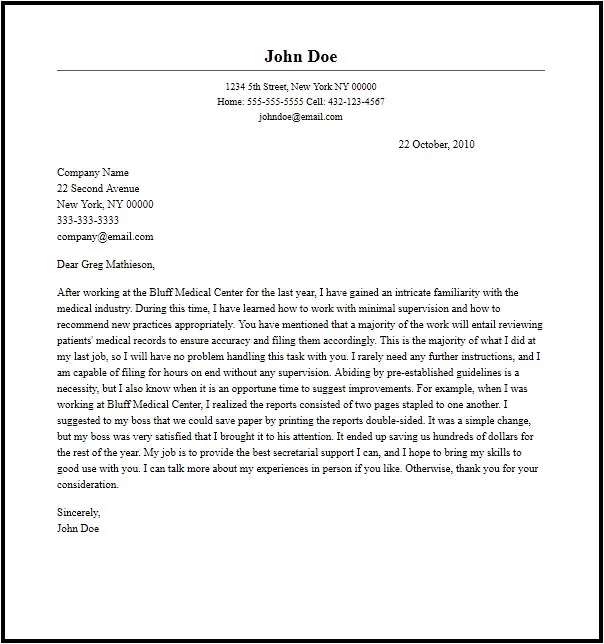
Whenever possible, quantify your achievements to demonstrate your impact. Use numbers and data to showcase your accomplishments. For example, state how you improved efficiency, reduced costs, or increased productivity. Quantifying your achievements adds credibility and demonstrates your value to the employer. Providing solid numbers provides evidence that you have what it takes to fill the position.
Expressing Enthusiasm and Fit
Throughout your cover letter, express your enthusiasm for the position and the company. Explain why you’re interested in the role and what motivates you. Briefly describe how your skills and experiences align with the company’s mission and values. Show that you’ve researched the company and understand their culture. This will help demonstrate your interest and make you a more compelling candidate. Your enthusiasm must be genuine. If you show that you are really excited to have the job, chances are the hiring manager will be excited to have you.
Writing a Strong Closing
Your closing paragraph should be concise and impactful. Restate your interest in the position and reiterate your key qualifications. Thank the reader for their time and consideration. Include a call to action, such as stating that you’re available for an interview and look forward to hearing from them soon. End your cover letter with a professional closing such as ‘Sincerely’ or ‘Best regards,’ followed by your full name. A strong closing will help you appear confident. Leave the hiring manager with a good impression.
Proofreading and Editing Your Cover Letter
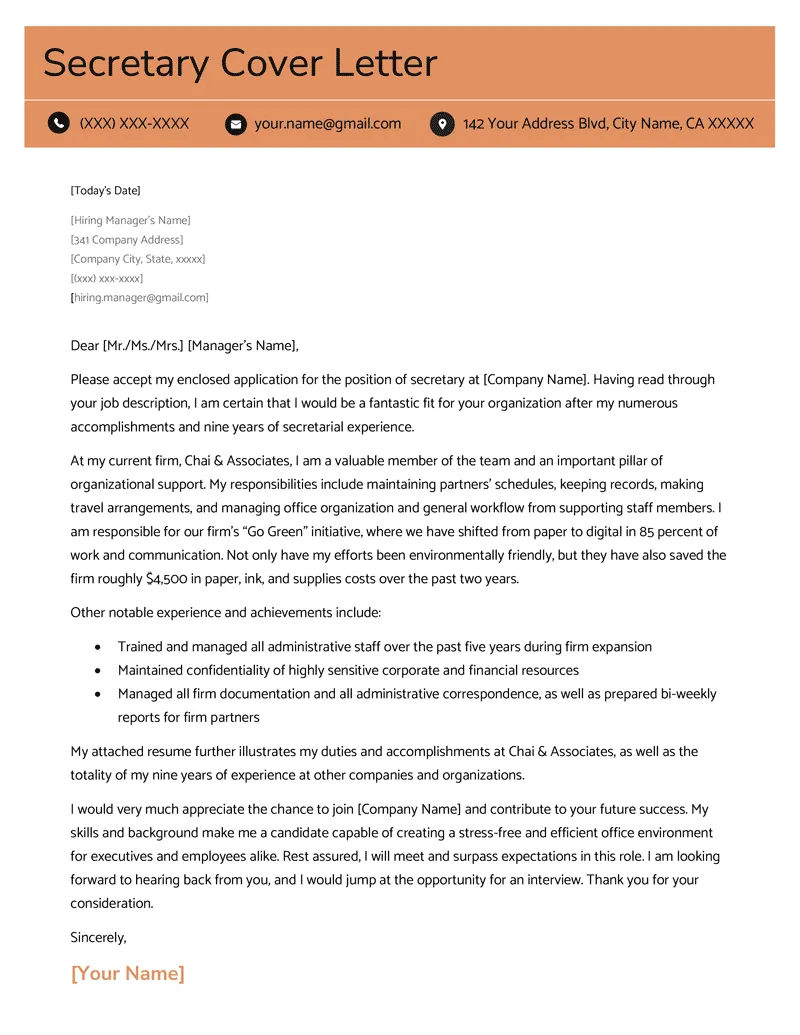
Before submitting your cover letter, proofread and edit it carefully to ensure it’s polished and error-free. Errors in your cover letter can create a negative impression, so it is important to get it right. This step shows your attention to detail and professionalism. Review your letter multiple times, and consider asking a friend or colleague to proofread it as well. Taking the time to perfect your cover letter will increase your chances of success.
Checking for Grammatical Errors
Carefully check your cover letter for grammatical errors. Ensure that your sentences are clear, and your grammar is correct. Look for spelling mistakes, punctuation errors, and incorrect word usage. Read your cover letter out loud to catch any awkward phrasing or sentences that don’t flow well. It can be useful to get someone else to read your letter. Make sure your grammar is impeccable.
Ensuring Clarity and Conciseness
Make sure your cover letter is clear, concise, and easy to understand. Avoid using jargon or overly complex language. Use short sentences and paragraphs to improve readability. Ensure that your cover letter conveys your message effectively and quickly. Your cover letter should be easy to read, and get straight to the point. This should not be a novel.
Tailoring Your Cover Letter to the Job
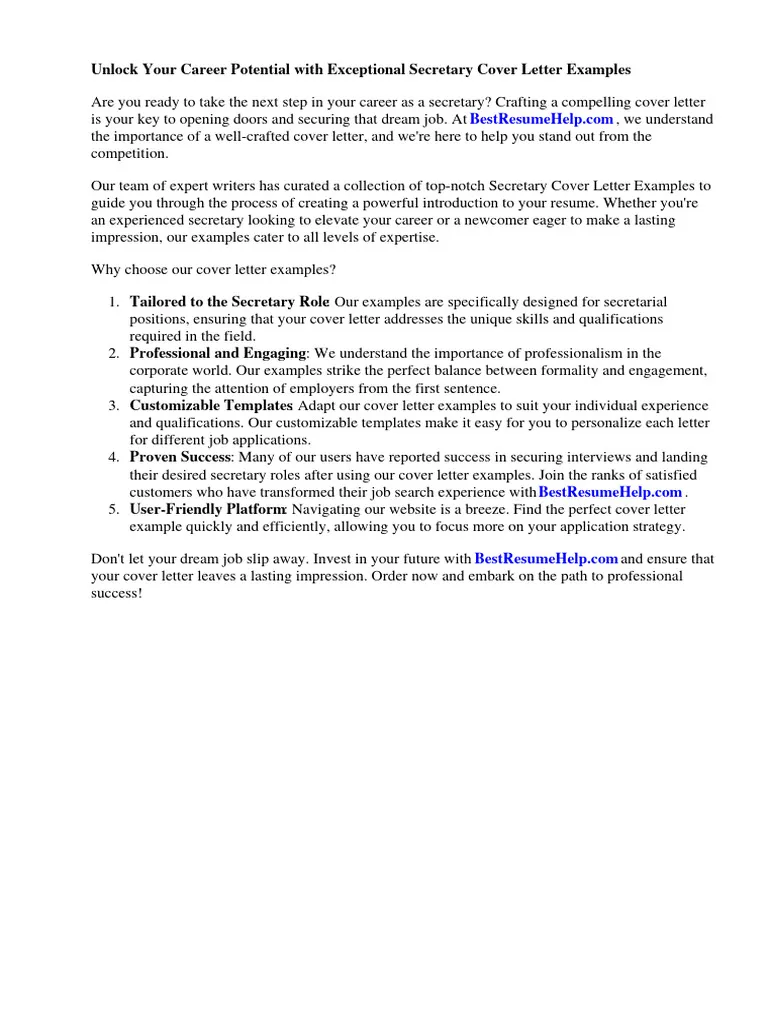
Tailoring your cover letter to the specific job is essential for increasing your chances of success. A generic cover letter won’t make a strong impression. Your cover letter should reflect your knowledge of the company and the role and make the hiring manager feel like you are the perfect person for the job. By taking the time to customize your cover letter, you can demonstrate that you’re genuinely interested in the position and have the specific skills and experience needed to excel.
Researching the Company
Before writing your cover letter, research the company to understand its mission, values, and culture. Visit the company’s website, read news articles, and check its social media profiles. Learn about the company’s products or services, recent achievements, and any industry recognition. This knowledge will help you personalize your cover letter and demonstrate your interest in the company. Demonstrating that you have done the research will make a very good impression.
Matching Skills to Job Requirements
Carefully review the job description and identify the required skills, experience, and qualifications. Highlight the skills and experiences that match the job requirements. Use the same keywords and phrases as the job description, but don’t simply copy and paste. Instead, incorporate the keywords naturally throughout your cover letter. Provide examples that show how you’ve demonstrated these skills in previous roles. Focus on the skills and experiences most relevant to the job. Tailoring your cover letter shows you have what it takes to succeed.
Using Keywords from the Job Description
The job description is a goldmine of keywords that employers are looking for. Incorporate these keywords naturally throughout your cover letter, especially in your opening paragraph, bullet points, and closing. This will help your cover letter pass through applicant tracking systems (ATS) and catch the attention of the hiring manager. Ensure you use keywords appropriately and in context. This ensures your cover letter gets noticed.
